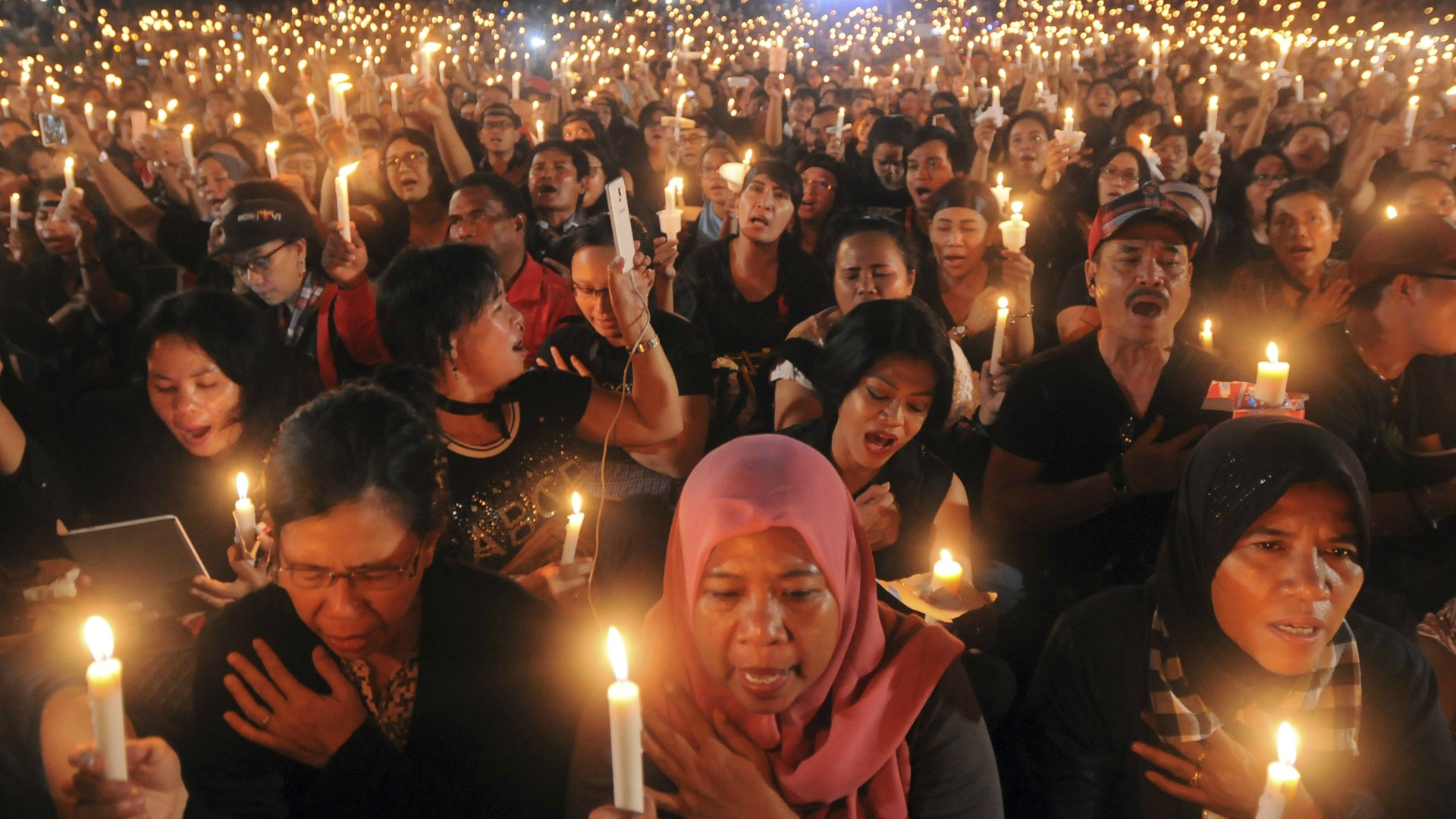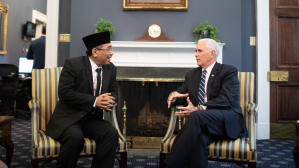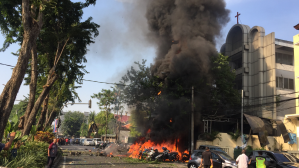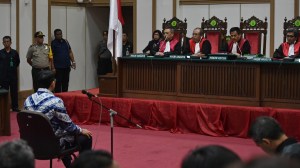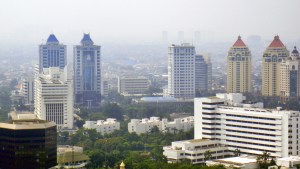In this series
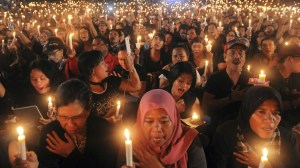
When I learned that the Christian governor of Jakarta had been convicted and imprisoned for blasphemy, I was stunned. So were my dinner companions: four senior Indonesian political leaders—three Muslims, one Christian.
We were celebrating the end of a grueling six-week tour, traveling the United States and Europe to promote the archipelago’s religious pluralism. We hoped to persuade political, military, academic, and religious leaders to work with Indonesians to overcome extremist Islamist ideology.
Earlier in the trip, we had received the dismaying news that Basuki Tjahaja Purnama—universally known as Ahok—had lost his election bid. But since we were laying a foundation for working with many in the West, at the time we were still encouraged.
With the news of Ahok’s sentencing to two years in prison, a pall fell over our gathering. Our very well-informed companions believed this victory for radicalism might be a prelude to the demise of democracy in Indonesia, the world’s largest Muslim-majority country.
But there are also reasons for hope.
After years of working on issues of religious persecution, principally in the Islamic world, I became convinced that little would change unless the dominant interpretations of Islam in the region changed.
That led me to pay more attention to Indonesia, a country I have long loved, since it is the largest source of democratic and open Islam. I became a senior fellow at the Leimena Institute, a Christian think tank in the capital, Jakarta, working with Christians and Muslims.
Here is my assessment of the situation, and why American Christians like me should care.
1) The Bad News
The conviction of Ahok culminates a bizarre election for the governorship of Indonesia’s capital city that made the recent US presidential election look sedate. He had been a capable and corruption-free governor, and in the campaign’s early days he held a large lead.
This was especially striking since Ahok is ethnic Chinese in a society where anti-Chinese sentiment remains strong, as well as a committed Calvinist Christian in a country that is 88-percent Muslim. Social media was replete with photographs of people holding signs declaring “I am a Muslim and I support Ahok.”
In a speech last September, Ahok made a reference to a Qur‘anic verse, al-Maidah 51, warning Muslims against taking Jews or Christians as allies. He said the verse was being misused to claim that Muslims are forbidden to vote for non-Muslims.
A few days later, a mendaciously edited video of his remarks went viral on the internet. Then the semi-official Indonesian Ulema Council issued a fatwa (a religious ruling) saying that Ahok had blasphemed.
Shortly after, the radical, sometimes violent, Islamic Defenders’ Front (FPI) teamed up with the newly formed “National Movement to Safeguard the Indonesian Ulema Council’s Fatwa” to demand that Ahok be arrested. There were massive demonstrations in Jakarta in November and December. On November 16, the police announced that he was being officially investigated for blasphemy.
The campaign then turned even more ugly. Anies Baswedan, the comparatively moderate former education minister and Ahok’s chief opponent, visited the FPI’s headquarters to give a speech and sat alongside its leader, Habib Rizieq. Radical preachers declared that Muslims were forbidden to vote for a non-Muslim. Several mosques displayed banners saying that any Muslim who voted for Ahok could never be given an Islamic burial.
Ahok continued to seek votes, going daily from his trial to the campaign trail. But on April 19, he lost the election by double figures.
While religion was the dominant feature of the campaign, it was warped by massive political manipulation and other salient factors. Ahok was opposed by the many politicians who benefit from endemic corruption. He was also contrarily portrayed as a tool of the rich, especially the Chinese-Indonesian businessmen who control much of Indonesia’s economy. Other major political players were funding the radicals. The FPI can make a lot of noise, but does not have the capability to organize massive demonstrations. Someone else was paying for those thousands of busses to bring in demonstrators from afar, as well as the neatly printed signs and shirts.
The election was also somewhat of a replay of Indonesia’s 2014 presidential election, when the current president, Jokowi, defeated Prabowo, son-in-law of the last dictator Soeharto and a former general suspected of human rights abuses. Since Jokowi is close to Ahok, and they had campaigned together, Prabowo is suspected of seeking revenge for his loss.
He is also thought to be looking ahead to a possible run in the 2019 presidential election since Jokowi was rumored to be considering Ahok as his running mate for vice president. Many of those backing the militant Islamic groups, including some generals, are not particularly Islamic themselves, but are trying to erode democracy and return Indonesia to an authoritarian system with a large role for the military.
The day after the vote, once the electoral damage had already been done, the prosecution dropped some of the charges against Ahok and recommended that he be given a light sentence of probation plus a one-year suspended jail term. But the judges ignored both this recommendation and the flimsiness of the evidence, and handed down the two-year sentence.
This awful election and the semi-farcical trial reveal the growing radicalization in Indonesia’s Muslim population. This is often led by a well-funded Saudi network of radical literature, schools, scholarships, imams, and mosques determined to wrest Indonesians away from their interpretations of Islam, which encourage democracy and peaceful relations between religions.
Indonesia’s social and political fabric has been stretched, and in coming years may be torn apart—especially if the patterns of this election are repeated in national contests.
2) The Good News
But the picture is not totally bleak. That an ethnic Chinese Christian on trial for blasphemy could gain 45 percent of the votes in a race to head the capital of the world’s largest Muslim-majority country is encouraging. In Pakistan, Afghanistan, Iran, Saudi Arabia, or Egypt, he would already be imprisoned, driven from the country, or be a bloody smear in the street.
Ahok can also appeal. And despite the loss in Jakarta, Indonesia still has two other Muslim-majority provinces, Central and West Kalimantan, whose elected governors are Christians.
Since the fall of Soeharto in 1998, Indonesia has been on an upward path. It has now had nearly two decades of free elections. It has the largest economy in Southeast Asia and also among the countries of the Organization of Islamic Cooperation. Based on present trends, in 20 years it could be one of the world’s five largest economies.
Surveys by the Pew Research Center indicate that Indonesian Muslims tend to be more pious than those in the Middle East. As they have become more aware of this, Indonesian Muslims are more confident in challenging radical views imported from the Arabian Peninsula. They are even establishing reconciliation and educational programs in Thailand, Malaysia, Philippines, Pakistan, and Afghanistan, as well as branches in the United States.
Many Muslims throughout the world understandably dislike being called “moderate” Muslims, usually for the same reason that many Christians would dislike being called “moderate Christians.” They are not lukewarm, but fervid in a faith that calls them to shun violence and live peaceably with their neighbors of any religion.
This aversion to the term moderation does exist in Indonesia. But more commonly, Indonesian Muslims are eager to affirm moderasi, or the Qur’anic term wasatiyah, meaning balanced and just Islam—an Islam called to be a supportive gift to the world.
They also stress “Islam Nusantara” (“Islam of the Archipelago”), since Indonesia’s approximately 15,000 islands make it the world’s largest archipelago. Islam Nusantara emphasizes that Indonesia is a country and people shaped by islands, coasts, ports, trade, and travel that over millennia have learned from Hindu, Buddhist, Muslim, Christian, and many other influences. In contrast to variants of Islam shaped in more restrictive desert cultures, it has majority Islamic beliefs and cultures comfortable with living alongside diverse people.
Of course, Indonesia is no utopia—Islamic or otherwise. It has endemic corruption, and its governments are often feeble in the face of local Islamist repression. Churches or temples are sporadically burned by radicals or closed by local governments, while the central government is often passive. There can be mob attacks on, and sometimes murder of, religious minorities thought to be heterodox—especially Ahmadiyya and Shia. ISIS has managed to launch small-scale attacks. Some parts of the country, such as West Java, South Sulawesi and the semi-autonomous province of Aceh, are religiously repressive and, in recent years, religious violence has been increasing.
But the vast majority of Indonesian Muslims continue to repudiate intolerant interpretations of Islam and resist more repressive versions being exported from the Middle East into their land.
3) Why American Christians Should Care
This means that Ahok’s defeat and conviction are important not only for Indonesians—who include over half of all Christians who live in Muslim-majority countries—but also for the rest of the world.
If the third-largest democracy on the planet succumbs to Islamic radicalism, then the future of the Muslim world and the rest of us looks dire. The major center of Muslim moderation—and the major counter to ISIS and similar ideologies—will be undercut. This will affect us all.
Too often when Westerners think of Islam, we default to images of the Middle East and Arabs, but these amount to only about one-fifth of the world’s Muslims. Of course, there are many reasons other than total population to focus on the Middle East. It has abundant oil and is rife with war, with the added specters of vicious persecution of religious minorities, terrorism, and the possibility of nuclear arms. But we need to pay more attention to the vast majority of Muslim-majority countries, which lie in Asia and Africa, to acquire an accurate picture of the world’s fastest-growing religion.
Another reason to pay attention to Indonesia is a self-interested one, though a justifiable self-interest. We need to learn why Muslims from the US are 20 times more likely than Muslims from Indonesia to try to join ISIS, and why Muslims from England or other parts of Europe are 100 times more likely to do so.
How do we overcome the ideology of groups like ISIS and Al Qaeda? America has been in a war for at least 17 years. No military or counterterrorism person I know believes that another year or 10 years or 20 years of brutal fighting will end the power of the ideologies that underlie and renew these protean conflicts. This war will be won only by Muslims who can discredit and defeat the radicals’ interpretations of Islam.
Since they suffer from these same ideological and physical attacks, important Indonesian Muslims want to be our allies in this struggle. On our aforementioned six-week tour, sponsored by Howard and Roberta Ahmanson along with the Leimena Institute, were:
- Ambassador Jakob Tobing, who—after the fall of Soeharto in 1998—chaired Indonesia’s first democratic election and then for three years chaired the commission that rewrote the constitution into a democratic document. A Christian, he is in many ways a second founding father of Indonesia.
- Alwi Shihab, former lecturer at Harvard, former foreign minister, and now the Indonesian president’s special envoy to the Middle East and to the Organization of Islamic Cooperation.
- Azra Azyumardi, a distinguished historian, advisor to Indonesia’s vice president, and former president of the State Islamic University in Jakarta. He is also a Commander of the British Empire, an award granted by the Queen for his services in countering extremism.
- Amin Abdullah, former president of the State Islamic University in Jogjakarta and current advisor to the sultan and governor of Jogjakarta. He is a philosopher who has developed new hermeneutics of Qur’anic interpretation and helped reform the curriculum of the Islamic universities.
They are a formidable group: powerful, learned, pious, kind, and committed.
As Shihab told us on the tour:
“Fifteen years ago, you were fighting Al Qaeda. Now you, and we, are fighting ISIS. Fifteen years from now, you will be fighting some other organization. But it is the same war; it is the same ideology. You need us, and we need you. We can be friends fighting a common enemy.”
As we struggle with increasing terrorism in the West, and extremism and bloody chaos in much of the Middle East, the threats to Indonesia—and especially Indonesian religion—deserve our focused and abiding attention.
Paul Marshall is Wilson Professor of Religious Freedom at Baylor University; senior fellow at the Leimena Institute, Jakarta, Indonesia; and senior fellow at the Hudson Institute. He is the author and editor of more than 20 books on religion and politics.

